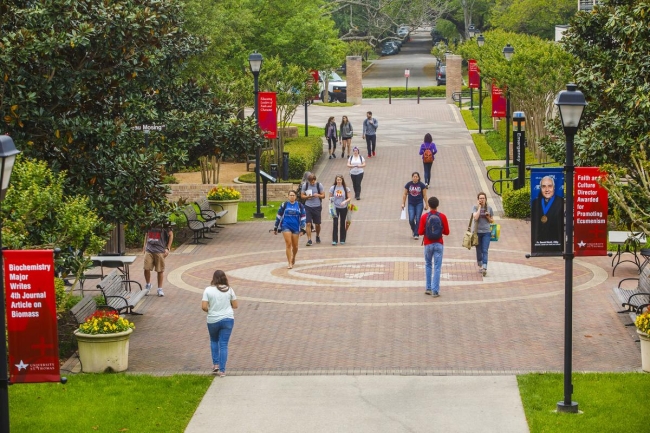You have /5 articles left.
Sign up for a free account or log in.

Gonzo 247/University of St. Thomas Houston
The University of St. Thomas Houston plans to launch a new online associate degree program taught entirely in Spanish to appeal to the city’s burgeoning Latino community, starting in spring 2023. Students who enroll in and complete the program will graduate with an associate of applied science in liberal studies.
The student body at the Catholic university, a Hispanic-serving institution, is 42 percent Latino, reflecting the population of the city, which is 44.5 percent Latino, according to the U.S. Census Bureau.
Administrators believe the program will draw an entirely new demographic within the local community that other colleges and universities might be overlooking. It aims to serve both native Spanish speakers who want to pursue a degree but may not speak fluent English and prospective students fluent in English who want to strengthen their Spanish skills.
Emiliano Gonzalez, chair for teaching and learning and the director for curriculum and instruction at the university, said there’s a “big need” in Houston for a fully Spanish program, especially among older immigrants who want to enhance their education and earn degrees to secure better jobs. He noted that the university previously introduced a master’s degree program in pastoral theology taught in Spanish, which has “taken off” and grown from 30 students enrolled to at least 250 students over several years.
“There’s a big, big market out there for the program,” said Gonzalez, who serves on the advisory committee guiding development of the associate degree program. He expects older members of the Latino community will be especially interested in it.
“When they come here, a lot of times they come to work and they really neglect their studies because they want to get their families ahead,” he said. “Later on, when they’re established and so forth, they want to continue.”
The university’s Kolbe School of Innovation and Professional Studies in 2019 began offering online associate degree programs that have drawn older students in their early to mid-40s, said Justo Garcia, an admissions counselor at the school.
For Garcia, who grew up in Houston and graduated from the University of St. Thomas Houston, this work hits close to home.
These students are going to be “moms, dads, uncles, aunts—people looking to go back to school or get the opportunity that they didn’t have before,” he said. “More personally, I think of my mom. I think of my older siblings. I think of people in my family that speak Spanish but may have misconceptions about access and schools, maybe a lack of opportunities or a lack of awareness of resources and opportunities.”
Applicants for the new associate degree program will undergo an interview process in part to gauge their Spanish and English language skills and to get a sense of their career plans postgraduation or interest in pursuing bachelor’s degrees. The university plans to embed English as a second language courses into the curriculum for interested students planning to pursue four-year degrees or who would otherwise benefit from bolstering their English skills. The hope is some students will continue on to bachelor’s degree programs at University of St. Thomas Houston.
Administrators also plan to offer courses that focus on Latin cultures and literature from Central and South America.
“We’ve got to make something that’s relevant that they can relate to, because if they’re just going to be studying Shakespeare, we’re going to lose a lot of people,” Gonzalez said.
Nicole McZeal Walters, dean of the School of Innovation and Professional Studies, said she hopes to attract up to 100 students to the program in its inaugural semester, but as of now, there’s no enrollment limit for the online program.
“I would never want to cap it,” she said. “We have the faculty and the facilities ready to take as many as needs to be.”
Deborah Santiago, CEO of Excelencia in Education, an organization focused on improving academic outcomes for Latino students, said the University of St. Thomas Houston isn’t the first American university to offer a degree or certificate program taught entirely or partially in Spanish. For example, South Mountain Community College in Phoenix offers a nursing fellowship program in Spanish to train nurses to better serve Latino communities.
She believes the trend started with higher ed institutions in Puerto Rico, including Ana G. Méndez University, which began offering bilingual satellite programs in the United States about 20 years ago.
Santiago sees the growth of these programs as a response to workforce needs. As Latino communities in the U.S. have grown, more industries and workplaces have benefited from having employees proficient in Spanish, especially in fields such as nursing or teaching.
These programs are “being responsive to the needs of the community, to strengthen the workforce so those working in hospitals or urgent care can find ways to relate to clients,” she said. “That’s been around for quite a while. I think it’s responsive to the market and to the community around it.”
She noted, however, that a program offered at a Catholic university may have extra appeal to a predominantly Catholic community. When she co-founded Excelencia, she had conversations with Latino students and parents about their college decisions and found that some parents were more comfortable sending their children off to college if they attended Catholic institutions.
“We’re not in the same space—that was really like 30 years ago—but I do find it interesting that there’s a little bit more trust,” she said.
She’s eager to see how the new program at the University of St. Thomas Houston goes and applauded it as a “student-centered” step that may inspire similar programs.
“We’re going to be watching to see what those numbers look like and the sustainability of the program, because we think it could be a bellwether of other things to come,” she said.





